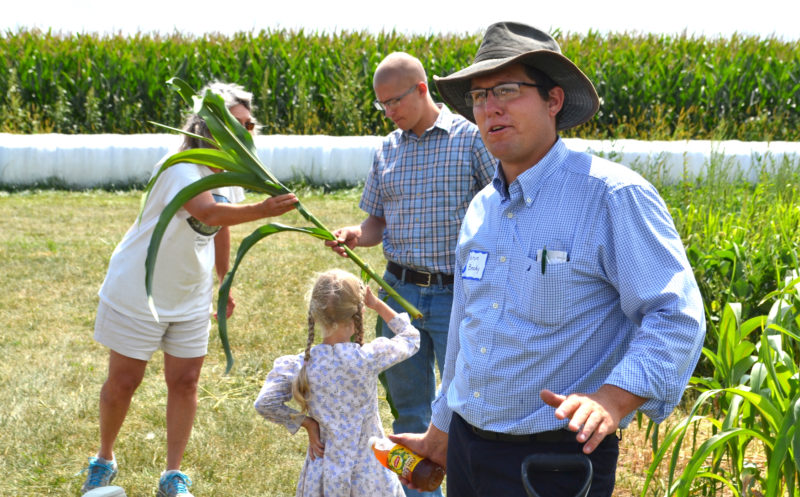Staff from the Land Stewardship Project’s Bridge to Soil Health Program have been getting out and visiting farms the past few months. These visits are primarily to: network and meet with farmers in our Soil Builders’ Network, see what practices people are trying out on the landscape, determine what farmers want more information on, and look for ingenuity in the countryside to share with the wider farming community.
These visits are primarily to: network and meet with farmers in our Soil Builders’ Network, see what practices people are trying out on the landscape, determine what farmers want more information on, and look for ingenuity in the countryside to share with the wider farming community.
One farm I visited recently is Red Rooster Ranch, run by Mervin and Cherlyn Beachy. Ensuring healthy soil is a fixture of everything they do on the farm. Mervin first got into soil health by getting interested in the nutrient density of the food he was growing, and the connection between healthy soil and healthy humans.
One way they regenerate the soil on the farm is through growing and selling cover crop seed locally. The farm is full of different cover cropping experiments and rotations. This year, in the field corn, they did a side-by-side interseeding trial comparing cover crop mixes with and without early cultivation in the corn.
They have tried all sorts of different rotations in their fields, including oats followed by warm season cover crops for their livestock. Cover crops are not just used in their larger fields, the gardens have buckwheat/cowpeas growing in-between the sweet corn rows, cereal rye between the green beans, and various warm season cover crop mixes on fallow parts of the garden.
Mervin also works as a certified forage specialist for Bryon Seeds out of Indiana. He serves as a consultant to farmers looking for the right rotations and forages. Through his relationship with Bryon Seeds, Mervin has access to a wide array of cover crops — including mixes from Europe.
“Europe seems to have fine-tuned a lot of their cover cropping, as it is required to grow covers and have an extended crop rotation. They have specific cover crop mixes for growing corn, or wheat, or any other crop,” says Mervin. He has been trialing out these mixes in small plots side-by-side, so it is easy to compare and for people to come and see for themselves.
The Rock Creek and Upper Cedar River watersheds, of which the farm is a part, have been focal points for reducing erosion and improving water quality. Different watershed groups have asked Mervin to speak at events about soil health and cover cropping. Mervin has been drilling cover crops for the past five years and now annually custom seeds cover crops on about 2,000 acres, mostly cereal rye, for neighboring farms. Just prior to my visit, Mervin and Cherlyn hosted a field day on their farm. Attendees could see the cover cropping mixes and experiments in person.
When asked how we get more people to become interested in cover crops, Mervin responds, “Well, that’s a million dollar-question, I would suggest things like longer rent agreements, so extended rotations and diverse covers can be used, and so farmers can see their return on investment. Corn and soybean markets can be stressful, but focusing on soil health can be a game changer for reducing inputs and yield variability.”
Mervin adds, “It starts with things like this, having a conversation with one farmer, who then talks to five other people and then it spreads.”
Connor Dunn is a former LSP soil health organizer.